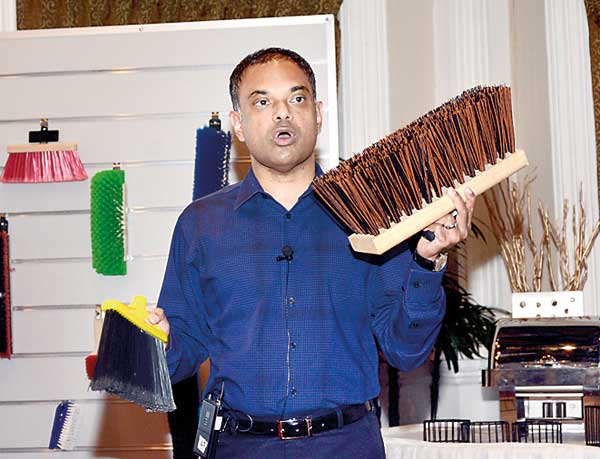Reply To:
Name - Reply Comment

In a step towards import substitution, Sri Lanka is now looking at the possibility of producing the country’s total fabric requirement domestically doing away with the imports which drains much needed foreign currency from the country.
To this end, a new venture is to be set up mainly targeting the textile producers who are one of the largest users of fabric in the country. Majority of their requirement is imported. Although garments are the top export income earning commodity, the value addition is just 50 percent (improving from 20 percent) as the industry is highly import dependant.
At present Sri Lanka’s leading brush-ware and filament exporter, Beira Parawood Products Limited (BPPL) extrudes fiber from post industrial and consumer Polyethylene terephthalate (PET) water bottles which are discarded by homes and commercial establishments for their production as well as to supply to other local brush-ware producers.
“We see lot of opportunities with the fiber that we extrude. Because, if you take the textile industry— companies such as Textured Jersey (Lanka PLC), Hayleys Fibre (PLC)— it’s the same but much thinner fiber they use.
They import this fiber. We are currently looking at if we can extrude this fiber and give it to the textile industry,” said the BPPL Managing Director, Dr. Anush Amarasinghe.
Dr. Amarasinghe, who is also a research engineer and an investor, is currently in negotiations with leading apparel manufacturers to get the project off the ground.
While the company already is rich with the infrastructure and the expertise in extracting fiber, the project demands a significant investment, sophisticated machinery and extruding recycled and polyester yarn.
BPPL is a home grown company with a 30-year history in the industrial and domestic cleaning brush-ware industry.
The company is jointly held by Infinity Capital (Pvt) Limited, an investment company owned by Dr. Amarasinghe with a 50.3 percent stake, followed by Lanka Orix Leasing Company PLC with a 26.3 percent stake and the top apparel manufacturer, Hirdaramani with another 23.4 percent stake.
The project, if come to fruition, will also minimize the imports of PET which has become a menace threatening the sustainability of the environment.
Sri Lanka currently imports 900 tones of PET which has doubled in just 6 years.
Currently, BPPL’s recycling plant and the filament factory converts waste PET bottles into plastic flakes which are in turn converted in to filaments for synthetic brushes. The company recycles 900,000 kilograms of plastic waste annually.
BPPL targets SA markets with own brand
BPPL is now looking at avenues to introduce its product range under its own brand to South East Asian and South Asian markets by way of joint ventures with retail chains and distributors already established in those markets.
Until late, the company has been exporting almost all of its produce under retailer brands but now the new owners must have thought the time is ripe for the company to look back its home region to leverage its affluent and growing middle income class.
Recently the company introduced its range of products into the Sri Lankan consumer through the Arpico Supercentre chain and selected Cargills Food City outlets. The company now wants to develop its modern trade network by making its product range available through all super market outlets in
Sri Lanka.
BPPL is hopeful of getting into the South East Asia’s most populous nation, Indonesia during 2016, followed by Malaysia and Singapore, which have per capita incomes of US $ 12, 000 and US $ 60, 000, respectively.
However the company will customize its range of products to better suit the Asian consumer as they prefer small-made, lighter products which are visually appealing and most importantly offer value for money.
“So, there is an opportunity there for us to grab. We will come up with a new range mainly targeting those markets,” Dr. Amarasinghe said.
The company’s products are already sold in India and Bangladesh and according to Dr. Amarasinghe, BPPL ranks among the top three cleaning and brush-ware manufacturers in Asia.
He confided that his company could command a competitive advantage in the region as his competitors offer the same line of products to Asian markets they offer in other markets in the world.
BPPL exports 70 percent of its products to leading brands in the United States while 13 percent is sent to Australia and New Zealand. United Kingdom has a 6 percent share in the market portfolio followed by 4 percent and 2 percent by Canada and Europe, respectively.
Company’s products do not fall into the Fast Moving Consumer Goods (FMCG) category and therefore command a relatively higher margin.
The company targets the middle class and the segments above in Sri Lanka and in the rest of the markets in South Asia.
BPPL operates five factories and warehouses spanning 210,000 square feet in extent, employing over 650 staff.
At a time when the Sri Lankans have chosen the easy way of flooding the markets with cheaper imports, BPPL has silently developed a manufacturing industry conquering the global market and now striving to build a home grown brand for its quality and sustainable products.